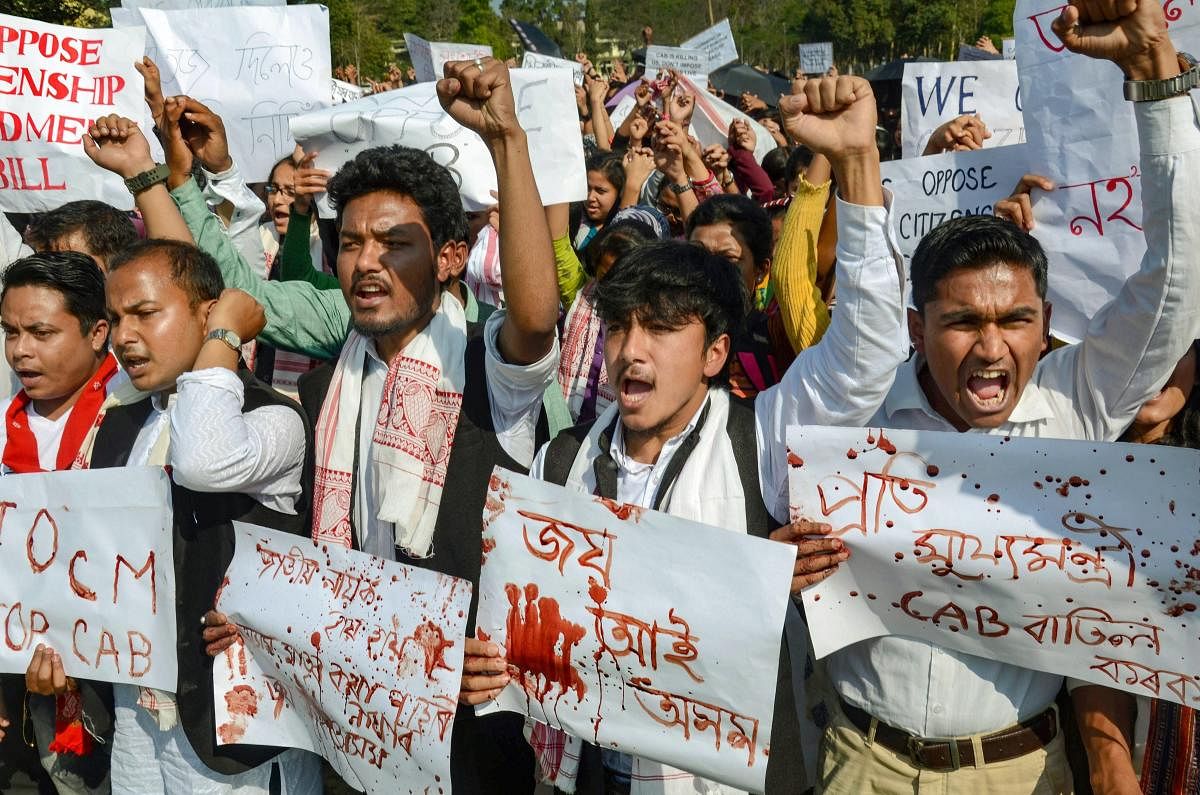The BJP’s surge since 2009 in seven states in the North-East, a traditional Congress bastion, has been nothing short of phenomenal. Alliances and understanding with the regional parties helped the saffron party double its Lok Sabha seat count from four in 2009 to eight in 2014. The same formula enabled it to not just lead governments in Assam, Manipur, Tripura and Arunachal Pradesh but be part of the governments in Christian-dominated Meghalaya and Nagaland, too.
This success led the BJP to float the North-East Democratic Alliance (NEDA), a forum of eight regional parties in 2016 with a target to make the North-East “Congress-mukt”. That target, too, was fulfilled in November last when the Mizo National Front (MNF), a NEDA partner, wrested power from the 10-year-old Congress government in Mizoram.
The outpouring of anger and protests and the “joint fight” by 11 regional parties, including all eight NEDA partners, against the Modi government’s Citizenship (Amendment) Bill 2019, however, has cast a shadow over the saffron party’s winning streak till the next Lok Sabha elections. The anger, for the time being, has subsided as the BJP relented and did not table the bill in the Rajya Sabha on February 12. But Prime Minister Narendra Modi’s open commitment in Guwahati to give citizenship to the “persecuted minorities” such as Hindus, Christians, Jains, Sikhs, Buddhists and Parsis from Pakistan, Bangladesh and Afghanistan has led many to believe that indigenous people would vote against BJP this time.
The NEDA partners are yet to make their stand clear regarding the Lok Sabha elections, but the influential student bodies vowed to continue their agitation against BJP’s commitment to give citizenship to “illegal migrants.” They want a solution to the foreigner issue with March 24, 1971, as the cut-off date, as agreed in the 1985 Assam Accord, irrespective of religion. For a region that has grappled with the “illegal migration” problem for long, the bill came as destructive to their ethnic identity.
Assam: “BJP’s vote share is likely to come down to its disadvantage and to the gain of Congress. This will happen mainly in the Brahmaputra Valley, having maximum indigenous Assamese voters,” said Hare Krishan Deka, a Sahitya Akademi awardee and former state police chief. The BJP had won seven of the 14 Lok Sabha seats in 2014 and also formed the state government with Asom Gana Parishad (AGP) and Bodoland People’s Front (BPF) as two major regional allies. The AGP quit the alliance on January 7, a day before the citizenship bill was passed in the Lok Sabha, and is unlikely to join hands with BJP again as that may affect its regional vote bank.
“In 2016, people did not elect BJP alone but voted for the pre-poll alliance, which promised to protect indigenous identity. But now, when BJP has taken a U-turn by bringing the bill and we have quit in protest, let them seek a fresh mandate,” senior AGP leader and former chief minister Prafulla Kumar Mahanta said. Many believe that the anger of the influential All Assam Students’ Union (AASU)over the bill will hit the BJP’s electoral prospects.
BJP leaders, however, sound confident, saying that their stand on the citizenship bill will help them consolidate the nearly 20% Bengali Hindu votes and the section of Assamese people who trust Hindutva ideology.
Meghalaya: Although BJP is not eyeing the two Lok Sabha seats, the initiative of Conrad Sangma, Meghalaya chief minister and chief of National People’s Party (NPP), to unite all regional parties, including the NEDA partners, against the bill became an embarrassment for BJP. NPP, formed by Conrad’s late father P A Sangma, is a partner in BJP-led governments in Manipur, Nagaland and Arunachal Pradesh, while BJP is part of Conrad’s government.
Manipur: BJP leads the state government in Manipur and is hoping to bag both the Lok Sabha seats, but Chief Minister Biren Singh’s strong stand against the citizenship bill took the saffron party by surprise. Singh had met union home minister Rajnath Singh with two options: either exempt Manipur from the bill’s purview or approve Manipur People’s (Protection) Bill, 2018, that seeks to regulate entry of non-Manipuris. Many say Singh had no option, given the strong anti-migrant sentiments among both Manipuris and the Nagas.
Mizoram: BJP wants MNF, a NEDA-partner, to bag the lone Lok Sabha seat and join NDA after elections, but the regional party chief and Chief Minister Zoramthanga’s warning that he would leave the NEDA over the bill is another embarrassment to the BJP. The protests against the bill by the influential NGO Co-Ordination Committee were so strong that they did not allow people to take part in this year’s Republic Day function at Aizwal and even vowed to work for an “independent Mizoram”.
Nagaland: The cabinet of the National Democratic Progressive Party (NDPP)-led government, of which BJP is an ally, took a resolution against the citizenship bill. The Opposition Naga People’s Front (NPF), too, continued to attack both BJP and NDPP over the bill. The NDPP had won the lone Lok Sabha seat last time.
Tripura: BJP is keen to wrest both the Lok Sabha seats from the Left but the anti-citizenship bill stand by IPFT, its ally in the state government, is a worry for the saffron party. The IPFT represents the indigenous Tripuri votes, mainly in the autonomous district council areas.
Arunachal Pradesh: Barring Assam, Arunachal Pradesh is the only other state in the North-East where BJP won a Lok Sabha seat in 2014, when junior home minister Kiren Rijiju got elected. The 40-member Assembly in the frontier state is also going for polls, along with the Lok Sabha elections.
The anti-citizenship bill outcry ahead of the Lok Sabha polls has prompted Congress to revamp the North-East Congress Co-Ordination Committee (NECCC) with former prime minister Manmohan Singh as its patron. Can NECCC neck out NEDA and make the North-East a Congress bastion again?
